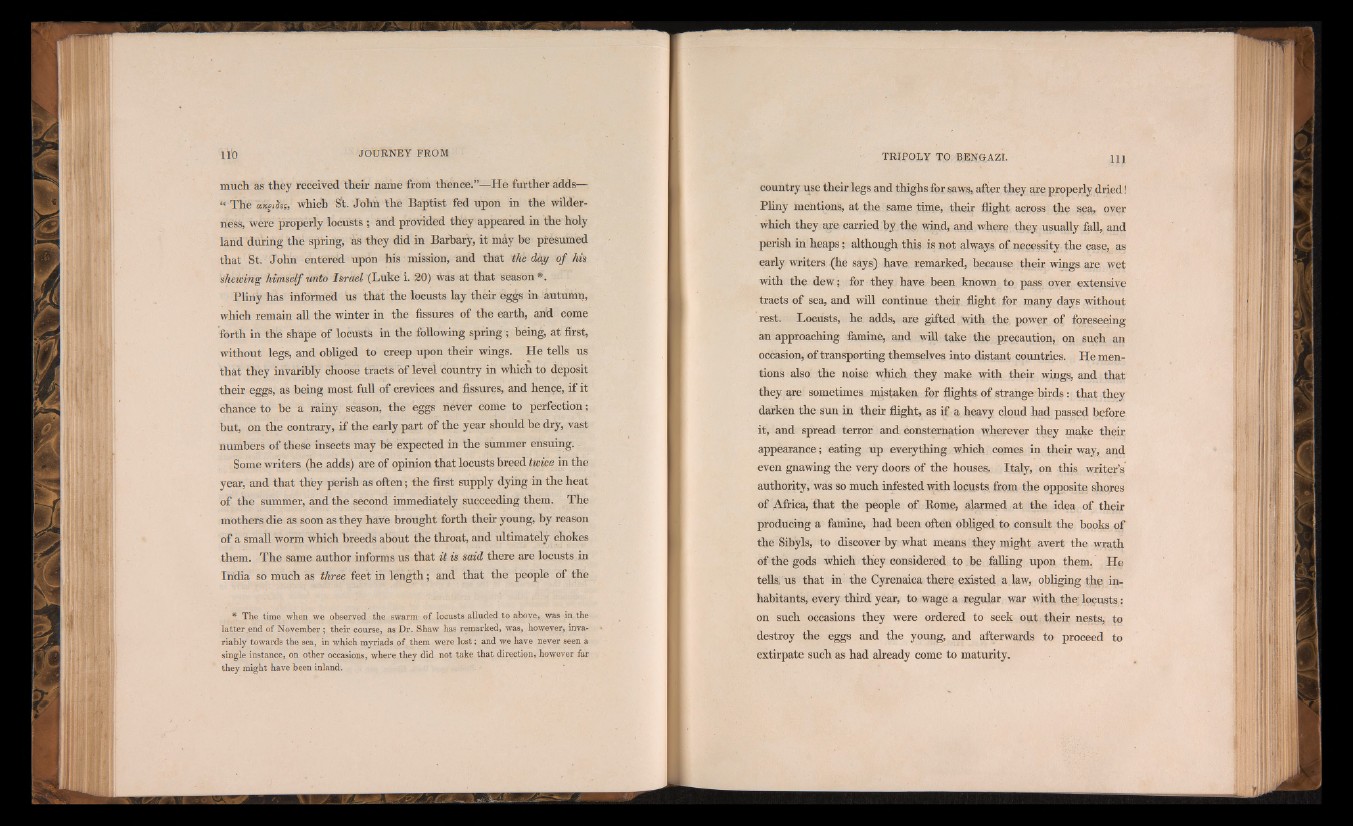
much as they received their name from thence.”—He further adds—
“ The axpifoe, which St. John the Baptist fed upon in the wilderness,
were properly locusts ; and provided they appeared in the holy
land during the spring, as they did in Barbary, it may be presumed
that St. John entered upon his mission, and that the day of his
shelving himself unto Israel (Luke i. 20) was at that season *.
Pliny has informed us that the locusts lay their eggs in autumn,
which remain all the winter in the fissures of the earth, and come
forth in the shape of locusts in the following spring ; being, at first,
without legs, and obliged to creep upon their wings. He tells us
that they invaribly choose tracts of level country in which to deposit
their eggs, as being most full of crevices and fissures, and hence, if it
chance to be a rainy season, the eggs never come to perfection;
but, on the contrary, if the early part of the year should be dry, vast
numbers of these insects may be expected in the summer ensuing.
Some writers (he adds) are of opinion that locusts breed twice in the
year, and that they perish as often; the first supply dying in the heat
of the summer, and the second immediately succeeding them. The
mothers die as soon as they have brought forth their young* by reason
of a small worm which breeds about the throat, and ultimately chokes
them. The same author informs us that it is said there are locusts in
India so much as three feet in length; and that the people of the
* The time when we observed the swarm of locusts alluded to above, was in the
latter end of November; their course, as Dr. Shaw has remarked, was, however, invariably
towards the sea, in which myriads of them were lost; and we have never seen a
single instance, on other occasions, where they did not take that direction, however far
they might have been inland.
country use their legs and thighs for saws, after they are properly dried!
Pliny mentions, at the same time, their flight across the sea, over
which they are carried by the wind, and where they usually fall, and
perish in heaps; although this is not always of necessity the case, as
early writers (he says) have remarked, because their wings are wet
with the dew; for they have been known to pass over extensive
tracts of sea, and will continue their flight for many days without
rest. Locusts, he adds, are gifted with the power of foreseeing
an approaching famine, and will take the precaution, on such an
occasion, of transporting themselves into distant countries. He mentions
also the noise which they make with their wings, and that
they are sometimes mistaken for flights of strange birds: that they
darken the sun in their flight, as if a heavy cloud had passed before
it, and spread terror and consternation wherever they make their
appearance; eating up everything which comes in their way, and
even gnawing the very doors of the houses., Italy, on this writer’s
authority, was so much infested with lopiists from the opposite shores
of Africa, that the people of Eome, alarmed at the idea of their
producing a famine, had been often obliged to consult the books of
the Sibyls, to discover by what means they might avert the wrath
of the gods which they considered to be falling upon them. He
tells, us that in the Cyrenaica there existed a law, obliging the inhabitants,
every third year, to wage a regular war with the; locusts;
on such occasions they were ordered to seek out their nests, to
destroy the eggs and the young, and afterwards to proceed to
extirpate such as had already come to maturity.